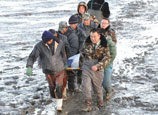
"Although it cannot be fully open, it must be a FTA with comparatively high liberalization and very comprehensive content," he said. "This is our common view."
In addition, during the meetings in Phnom Penh, 10 ASEAN nations and six dialogue partners, namely China, South Korea, Japan, India, Australia and New Zealand, officially started negotiations for the Regional Comprehensive Economic Partnership (RCEP).
ASEAN 10+3 has become "the principle axis of the economy and trade of East Asia, which is a new engine for growth," Bark said.
Developed economies such as Europe, the United States and Japan, are suffering a stumbled economy and sluggish growth, which "have no power to boost the global economic development, Bark said, adding that the emerging economies including China, ASEAN and India are the main momentum.
Meanwhile, Bark also pointed out that the political, territorial and historical issues among South Korea, China and Japan hindered the development of the three countries' economic and trade cooperation to some degree.
Issues of pure domestic politics can be tackled by the principle of "separation of politics and economics," he said. However, "if the event matters with a country's core interests, it will definitely affect the economic and trade relations," he added.
















 Memorial service held for China's fighter jet production head
Memorial service held for China's fighter jet production head


![]()
